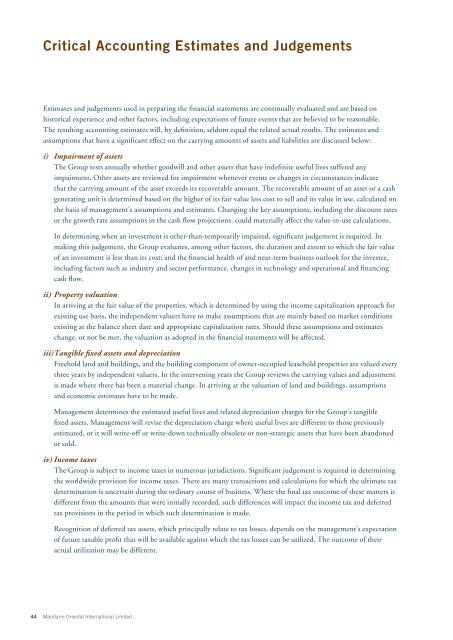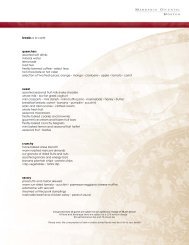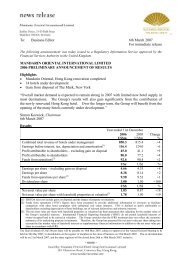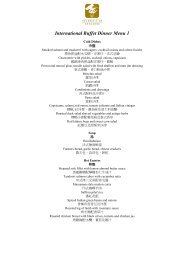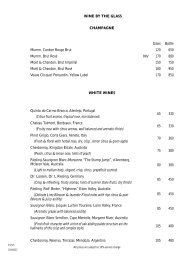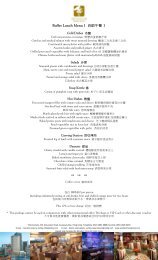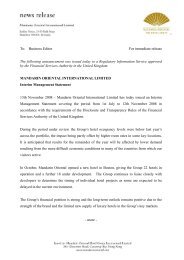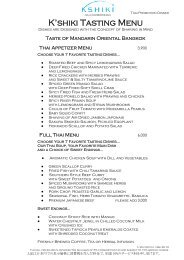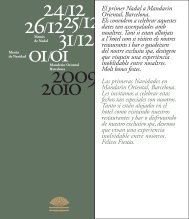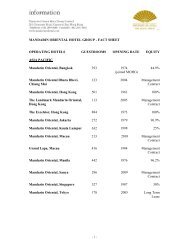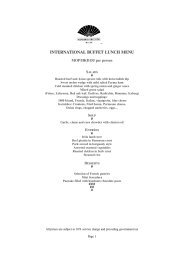Mandarin Oriental International Limited - Mandarin Oriental Hotel ...
Mandarin Oriental International Limited - Mandarin Oriental Hotel ...
Mandarin Oriental International Limited - Mandarin Oriental Hotel ...
You also want an ePaper? Increase the reach of your titles
YUMPU automatically turns print PDFs into web optimized ePapers that Google loves.
Critical Accounting Estimates and Judgements<br />
Estimates and judgements used in preparing the financial statements are continually evaluated and are based on<br />
historical experience and other factors, including expectations of future events that are believed to be reasonable.<br />
The resulting accounting estimates will, by definition, seldom equal the related actual results. The estimates and<br />
assumptions that have a significant effect on the carrying amounts of assets and liabilities are discussed below:<br />
i) Impairment of assets<br />
The Group tests annually whether goodwill and other assets that have indefinite useful lives suffered any<br />
impairment. Other assets are reviewed for impairment whenever events or changes in circumstances indicate<br />
that the carrying amount of the asset exceeds its recoverable amount. The recoverable amount of an asset or a cash<br />
generating unit is determined based on the higher of its fair value less cost to sell and its value in use, calculated on<br />
the basis of management’s assumptions and estimates. Changing the key assumptions, including the discount rates<br />
or the growth rate assumptions in the cash flow projections, could materially affect the value-in-use calculations.<br />
In determining when an investment is other-than-temporarily impaired, significant judgement is required. In<br />
making this judgement, the Group evaluates, among other factors, the duration and extent to which the fair value<br />
of an investment is less than its cost; and the financial health of and near-term business outlook for the investee,<br />
including factors such as industry and sector performance, changes in technology and operational and financing<br />
cash flow.<br />
ii) Property valuation<br />
In arriving at the fair value of the properties, which is determined by using the income capitalization approach for<br />
existing use basis, the independent valuers have to make assumptions that are mainly based on market conditions<br />
existing at the balance sheet date and appropriate capitalization rates. Should these assumptions and estimates<br />
change, or not be met, the valuation as adopted in the financial statements will be affected.<br />
iii) Tangible fixed assets and depreciation<br />
Freehold land and buildings, and the building component of owner-occupied leasehold properties are valued every<br />
three years by independent valuers. In the intervening years the Group reviews the carrying values and adjustment<br />
is made where there has been a material change. In arriving at the valuation of land and buildings, assumptions<br />
and economic estimates have to be made.<br />
Management determines the estimated useful lives and related depreciation charges for the Group’s tangible<br />
fixed assets. Management will revise the depreciation charge where useful lives are different to those previously<br />
estimated, or it will write-off or write-down technically obsolete or non-strategic assets that have been abandoned<br />
or sold.<br />
iv) Income taxes<br />
The Group is subject to income taxes in numerous jurisdictions. Significant judgement is required in determining<br />
the worldwide provision for income taxes. There are many transactions and calculations for which the ultimate tax<br />
determination is uncertain during the ordinary course of business. Where the final tax outcome of these matters is<br />
different from the amounts that were initially recorded, such differences will impact the income tax and deferred<br />
tax provisions in the period in which such determination is made.<br />
Recognition of deferred tax assets, which principally relate to tax losses, depends on the management’s expectation<br />
of future taxable profit that will be available against which the tax losses can be utilized. The outcome of their<br />
actual utilization may be different.<br />
44 <strong>Mandarin</strong> <strong>Oriental</strong> <strong>International</strong> <strong>Limited</strong>


